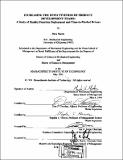Increasing the effectiveness of product development teams : a study of quality function deployment and time-to-market drivers
Author(s)
Martin, Mark (Mark Valeton)
DownloadFull printable version (4.330Mb)
Other Contributors
Sloan School of Management.
Advisor
Don P. Clausing and Stephen C. Graves.
Terms of use
Metadata
Show full item recordAbstract
Over the last two decades, manufacturing expertise and quality have been a prime focus of most companies. As the playing field becomes more level in these areas, however, more companies are looking for other sources of competitive advantage. One area which has come under increasing attention is that of product development. This thesis researches methods for increasing the effectiveness of product development teams. It looks at ways to enhance the ability of these teams to deliver a product with a high degree of customer satisfaction in a compressed amount of time. The author spent six months at a consumer product company where a case study was done on the use of a product development tool called quality function deployment (QFD). Implementation and effectiveness issues of QFD were researched, with the conclusion that QFD is a useful tool for structuring the product development process, but that it must be used as part of an overall project strategy, and not as the main strategy itself Also researched was whether or not design team participation in customer interviews would affect the team members' commitment to and alignment with customer needs. Although a detailed research design was planned and carried out, no statistically conclusive results could be determined from the data. The author speculates that one of the major drivers of these inconclusive results was the team's focus on schedule. This time-to-market pressure was studied in more detail in order to determine its root causes. The research indicates that for many product development projects the root causes of time-to-market pressure span the whole hierarchy of the company, and this hierarchy can be broken into four levels: the level of the firm, level of the project, level of the individual, and level of the task.
Description
Thesis (S.M.)--Massachusetts Institute of Technology, Dept. of Mechanical Engineering; and, (S.M.)--Massachusetts Institute of Technology, Sloan School of Management, 1994. Includes bibliographical references (p. 95-96).
Date issued
1994Department
Massachusetts Institute of Technology. Department of Mechanical Engineering; Sloan School of ManagementPublisher
Massachusetts Institute of Technology
Keywords
Mechanical Engineering., Sloan School of Management.